Plentiful



VFBF Women celebrated a year of grassroots engagement during their annual leadership conference.
A nostalgic look at some sentimental items farmers have had for decades or more!
Some farms grow produce specifically to share with food-insecure neighbors.

These holiday plants are grown in Virginia,
the
Volume 81, Number 4 November 2022
Virginia Farm Bureau News (USPS 017763) (ISSN 1525-528X) is published four times a year. January, April, September, November. It is published by Virginia Farm Bureau Federation, 12580 West Creek Parkway, Richmond, VA 23238. Periodicals postage rate is paid at Richmond, VA and additional mailing offices. The annual Subscription Rate is $1.13 (included in membership dues).
Postmaster: Please send changes of address to, Virginia Farm Bureau Federation, Farm Bureau News, P.O. Box 27552, Richmond, VA 23261-7552; fax 804-290-1096. Editorial and business offices are located at 12580 West Creek Parkway, Richmond, VA 23238. Telephone 804-290-1000, fax 804-290-1096.
Email virginiafarmbureaunews@vafb.com. Office hours are 8 a.m. to 4:30 p.m., Monday through Friday.
Members — Address change? If your address or phone number has changed, or is about to change, contact your county Farm Bureau. They will update your membership and subscription information.
All advertising is accepted subject to the publisher’s approval. Advertisers must assume liability for the content of their advertising. The publisher assumes no liability for products or services advertised. The publisher maintains the right to cancel advertising for nonpayment or reader complaints about services or products.
Member: Virginia Press Association
EDITORIAL TEAM
Pam Wiley Vice President, Communications Kathy Dixon Managing Editor Nicole Zema Staff Writer/Photographer
Adam Culler Staff Writer/Photographer
Maria La Lima Graphic Designer
Alice Kemp Staff Writer/Advertising Coordinator
Wayne F. Pryor, President Scott E. Sink, Vice President
DIRECTOR DISTRICT COUNTY
Emily F. Edmondson 1 Tazewell
Richard L. Sutherland 2 Grayson
Bruce N. Stanger 3 Montgomery
Jeannie L. Dudding 4 Craig Russell L. Williams II 5 Rockbridge
Peter A. Truban 6 Shenandoah
Thomas E. Graves 7 Orange
Leigh H. Pemberton 8 Hanover
William F. Osl Jr. 9 Cumberland
Robert J. Mills Jr. 10 Pittsylvania
J. M. Jenkins Jr. 11 Lunenburg
J. Barry Bates 12 Essex
M. L. Everett Jr. 13 Southampton
David L. Hickman 14 Accomack
A. Faye Hundley * Essex
Lindy Tucker Fimon ** Lunenburg
*Women’s Committee Chairman
**Young Farmers Committee Chairman
WE’RE SOCIAL!
“We are really working to bridge the gap for folks who have trouble accessing healthy food.”
— ERIN LINGO, Shalom Farms, Richmond
For98 years the Puerto Rico Farm Bureau, formerly the Puerto Rico Farmers Association, has been supporting farmers, ranchers, fishermen and agribusinesses in this unincorporated U.S. territory.

And for the first time ever, the American Farm Bureau Federation Annual Convention will be held in San Juan, Jan. 6-11. I am excited about gathering with fellow Farm Bureau members for the 104th convention as we celebrate the theme “Mi Familia,” or “My Family.”
For the past few years, Puerto Rico Farm Bureau’s growth and resilience have been celebrated during the annual event, and the organization is looking forward to extending their hospitality and hosting us this time.
The convention allows us to help set the national political agenda for next year, and offers opportunities for advancing leadership skills, expanding business savvy and gaining insight into trends impacting agriculture. We also get to support our Young Farmers who will be competing in the Excellence in Agriculture Award, Achievement Award and Discussion Meet programs.
The fact that all this is happening on a Caribbean island that is just a short flight from many airports in Virginia is an added bonus!
Puerto Rico is known for its hospitality—and its food. Puerto Rican fare is as diverse as its territory’s agriculture, which convention attendees will have the chance to explore. I hope if you go to the convention, you’ll take advantage of the unique tours being offered this year—from coffee and sugar cane operations to pineapple and plantain farms.

The hotel our Virginia delegation is staying in will enable you to explore beautiful Old San Juan, enjoy the beach and sample local food when not participating in convention programming.
Like farmers across the country, Puerto Rico producers have faced their share of trials. But they also have banded together and come back stronger—thanks to their resilient community and support from the Farm Bureau organization.
Registration for the 2023 convention opened in October, and I hope you will consider making plans to join me at this historic convention as we celebrate our Farm Bureau familia.
Wayne F. Pryor, a Goochland County hay and grain producer, is president of Virginia Farm Bureau Federation.
San Juan's convention center includes modern amenities and plenty of space for major events like the American Farm Bureau Federation Annual Convention.

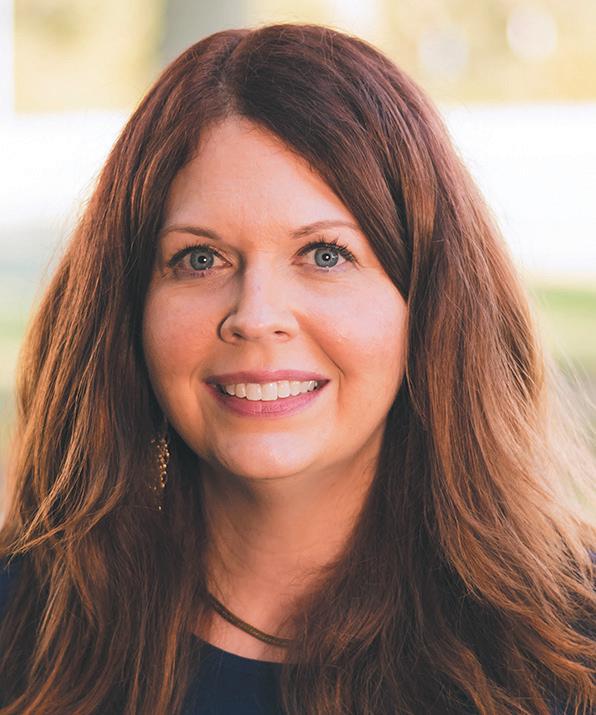
Kelly Roberts has joined Virginia Farm Bureau Federation as director of special programs.
Roberts brings 18 years of experience in outreach and advocacy and will work closely with the organization’s members and volunteers. She will oversee the VFBF Young Farmers Program, the VFBF Women’s Leadership Program, the VFBF Safety Program and Virginia Agriculture in the Classroom.
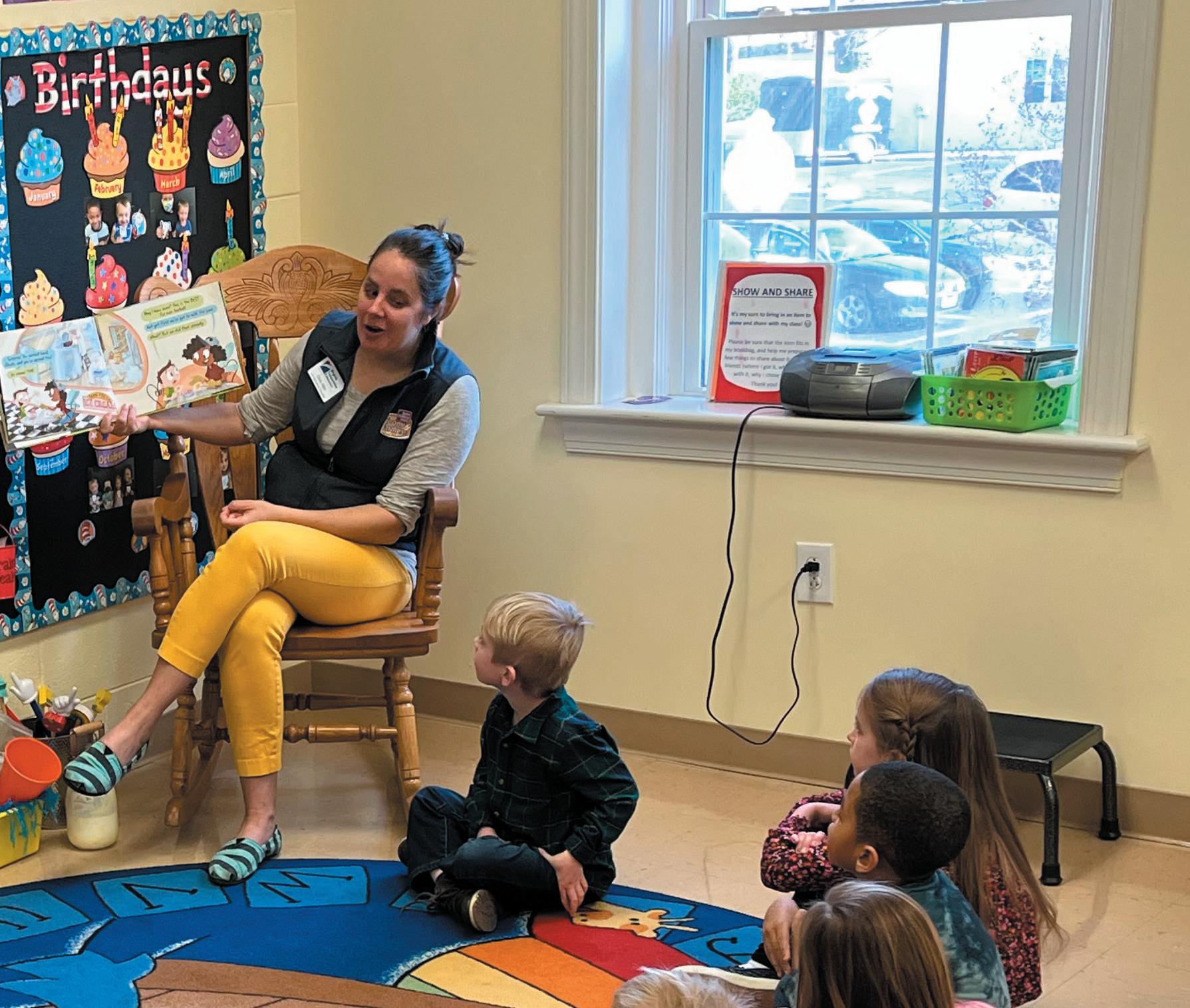
The Augusta County native returns to Farm Bureau from the United Network for Organ Sharing, where she was manager of corporate affairs. Before her role at UNOS, Roberts worked for Farm Bureau as special projects coordinator for communications, grassroots coordinator for governmental relations, and then assistant director of member engagement for governmental relations.
Roberts holds a bachelor’s degree in English from Virginia Commonwealth University and a master’s degree in strategic public relations from George Washington University.
She lives in Glen Allen with her husband and rescue dogs.
Featured this month on Real Virginia, Virginia Farm Bureau’s weekly television program:
• Some military veterans are learning to apply existing skills in new farming careers.
• Microgreens are becoming more popular among farmers market customers.
• More home gardeners are cultivating full-flavored muscadine grapes.
Real Virginia airs nationwide at 3:30 p.m. on the first Saturday of each month on RFD-TV on Dish Network and DirecTV, and on selected cable outlets around the state. It airs weekly on WBRA digital channel 15.2, WHRO Norfolk, WVVA Bluefield and WTKR Norfolk, and on the first and third weekends of each month on WVIR Charlottesville, WHSV Harrisonburg and WRLH Richmond.
Watch Real Virginia anytime online at youtube.com/user/ VirginiaFarmBureau
That’s the record-breaking amount raised for Virginia Agriculture in the Classroom this past year. Since 1992, the nonprofit has been connecting schoolchildren with agricultural concepts, leading to 500,000 students better understanding the value of agriculture each year. See related article, page 18.
Additionally, Bob Farmer, writer and spokesman for the Farmers’ Almanac, will entertain audiences during the Fellowship Luncheon on Nov. 30. Farmer brings this treasured publication alive with his unique down-home wit.
The Nov. 30 and Dec. 1 annual meeting of voting delegates will include important policy discussion and elections for VFBF president, vice president, state Women’s Leadership Committee chair, state Young Farmers Committee chair and directors to represent Districts 3, 6, 9 and 12.
“Together We Grow” is the theme of the 2022 Virginia Farm Bureau Federation Annual Convention and Meeting of Voting Delegates.
The event will begin the evening of Nov. 28 with a welcome reception in the exhibit hall at The Greenbrier® Resort in White Sulphur Springs, West Virginia, and conclude on the morning of Dec. 1.
Located amid picturesque mountains, The Greenbrier is a National Historic Landmark and world-class resort that has welcomed guests since 1778. Called “America’s Resort,” it has hosted 28 of the country’s 46 presidents.

Charles (Charlie) Wilfong, president of West Virginia Farm Bureau, will welcome guests to the Farm to Table Luncheon on Nov. 29. Wilfong has served as president of West Virginia Farm Bureau since 1997 and has been a member of the WVFB board of directors since 1983. He and his family operate Wilfong Farms in West Virginia’s Pocahontas County, which borders Virginia’s Bath and Highland counties. The business consists of 10,000 acres of timberland and farmland on which the Wilfongs raise cattle, sheep, hay and corn.
Matt Lohr, Virginia secretary of
agriculture and forestry, also will speak during the luncheon. Lohr was raised on a Virginia Century Farm in the Shenandoah Valley. As a fifthgeneration farmer, he has spent his life working for the betterment of the agricultural industry and rural America.
Over the past two years, Lohr served as chief of the U.S. Department of Agriculture’s Natural Resources Conservation Service. He previously served in the Virginia House of Delegates from 2006 to 2010 before being appointed commissioner of the Virginia Department of Agriculture and Consumer Services.
Convention attendees can participate in the Washington Update workshop on Nov. 29. Andrew Walmsley, American Farm Bureau Federation senior director of government affairs, will provide an overview of what to expect from the 118th Congress and how the 2023 Farm Bill will impact agriculture in America.
Judging will be held Nov. 29 for the Young Farmers Achievement Award and the final round of the Young Farmers Discussion Meet. Winners will be announced Nov. 30.
In addition, the inaugural 2022 Agriculture and Forestry Innovation “Bull Pen” Challenge sponsored by the Virginia Foundation for Agriculture, Innovation and Rural Sustainability will take place on Nov. 29.
VA FAIRS also will host a reception before dinner on Nov. 29, showcasing Virginia foods, spirits, wines and beers. Guests will have free time during the convention to explore the resort and participate in tours and other activities.
The convention also will include presentations of the county Farm Bureau Awards of Excellence on Nov. 30.




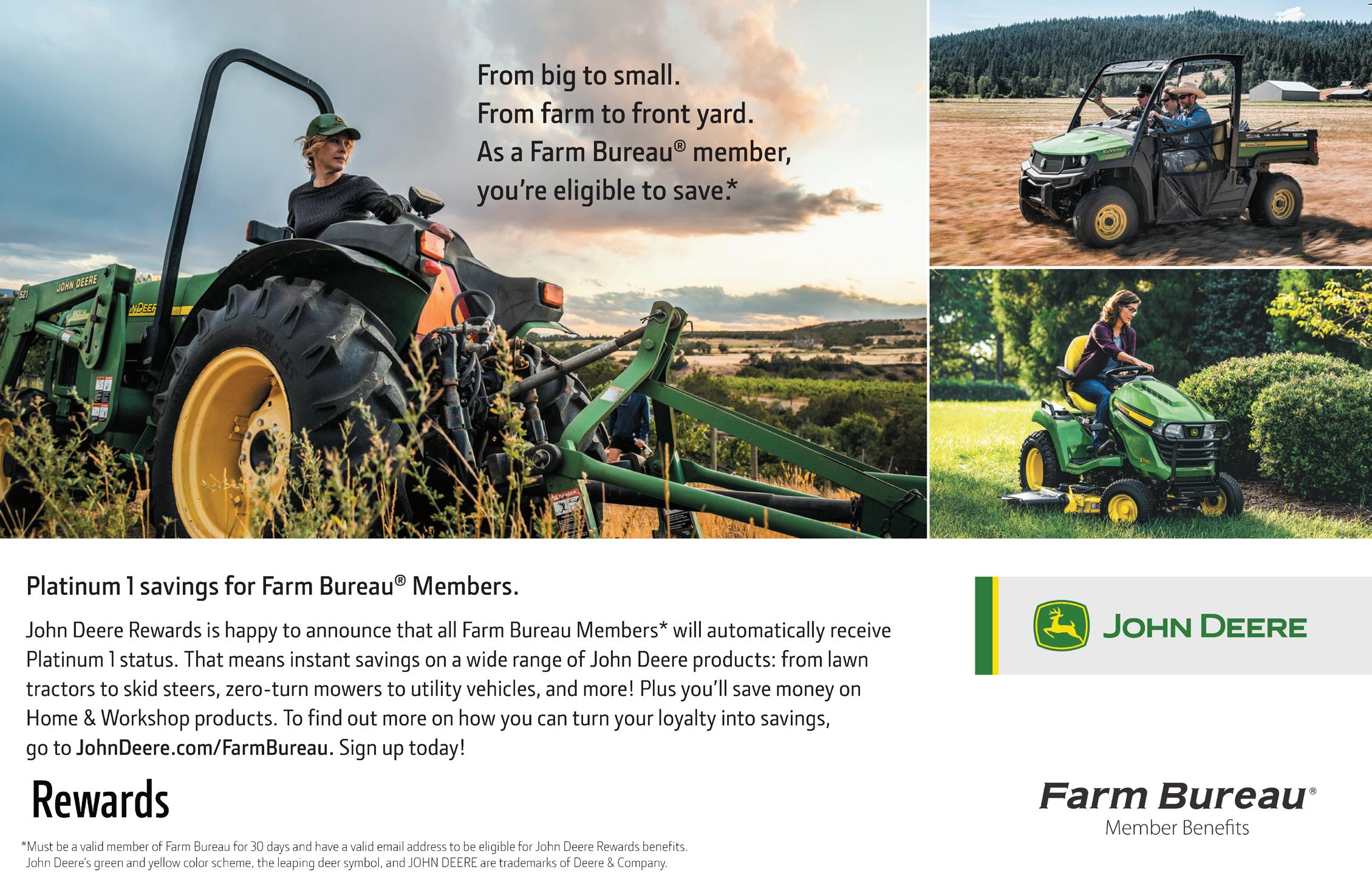
Virginia Farm Bureau members can get paid for leasing land to Vogue Towers for installing a wireless communication tower.
VFB has partnered with Vogue Towers to implement a marketing program to further wireless connectivity throughout Virginia while compensating Farm Bureau members. Vogue’s management team has built more than 5,000 towers in the U.S. since 1996. Cell towers allow wireless networks to better serve the communities in which they’re located, improving cell phone reception and ensuring the highest level of safety.
Members who are interested in leasing land for a tower should register their information with Vogue Towers through our website, vafb.com/membership-at-work/membership/ benefits/VogueTowers. Registration is not a commitment to lease your property, but simply an expression of interest in the program. After you submit an opt-in form on that page, Vogue Towers will contact you directly when they are seeking space for towers in your area.
If a tower is built on a member’s property, that member will be paid a one-time fee and then receive a monthly rent with annual escalation. The initial lease is for a 5-year term with seven 5-year renewals.
The leased area will be 55' x 55' up to 75' x 75', and the height will be determined by the phone carrier. All towers will have a secure, fenced compound. Vogue maintains insurance on the tower and takes care of all ground maintenance.
Prescription drug prices have skyrocketed over the last few years, but Farm Bureau members in Virginia are now eligible to receive free generic prescriptions delivered right to their door!
My Free Pharmacy is offering VFB members a special subscription rate of $17.96 a month for individuals or $26.96 monthly for families.
Members then receive free 21-day supplies of 125 generic acute medications at any pharmacy nationwide and 90-day supplies of chronic care generic medications, with free shipping to your door. They also are eligible to purchase overthe-counter medications at a fraction of the price on chronic care generic medications.
Westmoreland County Farm Bureau member Summer Downs signed up for the program and said even with the monthly subscription fee, her family will save almost $200 a month. “They have 85% of the medications we need, and the website is easy to use.”
Access the pharmacy helpline at 800-257-8420, or visit myfreepharmacy.com/virginia
Travel ServicesYour Farm Bureau membership gives you access to two programs offering significant savings at thousands of hotel properties. Reservations are required, and blackout dates may apply.
The Choice Hotels International program offers a 20% discount off “best available rates” for Farm Bureau members at more than 5,000 locations. To access this discount rate, call 800-258-2847 or visit choicehotels.com. Use the Virginia Farm Bureau identification number, available at vafb.com/ benefits and from your county Farm Bureau, when making a reservation. Present your membership card when you check in.
Whether you’re looking for an upscale hotel, an allinclusive resort or something in between, Wyndham Hotels & Resorts has the right hotel for you! As a Virginia Farm Bureau member, you will save up to 20% off the “best available rate” at over 8,000 participating hotels worldwide.
To take advantage of this discount rate, call 877-670-7088 or visit wyndhamhotels.com/farm-bureau.
Be on the lookout: The U.S. Department of Agriculture will mail the 2022 Census of Agriculture forms to 2.9 million agriculture producers across the 50 states and Puerto Rico this month.
The census allows farmers to provide comprehensive, impartial data about agriculture in every state and county in the nation. An invitation to respond online will be mailed in November, followed by paper questionnaires in December.
“This is the only source of completely unbiased information about American agriculture that is used by so many people,” noted Jodi Halvorson, public affairs specialist for USDA’s National Agricultural Statistics Service.
Farm operations of all sizes—both rural and urban—that produced or sold $1,000 or more of agricultural products in 2022 are eligible to be included in the census.
Conducted every five years by NASS, the census shows the value of U.S. agriculture by highlighting land use and ownership, farmer characteristics, production practices and income and expenditures, among other topics.
New questions on the 2022 forms focus on the use of precision agriculture, hemp production, internet access and raising hair sheep. The deadline to reply is Feb. 26, 2023, and results are expected to be released in the spring of 2024.
To learn more, visit nass.usda.gov/ AgCensus or call 800-727-9540.
Last year, the Virginia Cooperative Wildlife Damage Management Program received calls from 119 farms reporting conflicts with or livestock losses from black vultures.

To help with those attacks, the Virginia Department of Agriculture and Consumer Services has implemented a new program to assist livestock producers who are losing livestock to black vultures.
“Black vulture damage is one of the most common wildlife issues livestock producers face,” explained Stefanie Taillon, senior assistant director of governmental relations for Virginia Farm Bureau Federation. “However, black vultures are federally protected under the Migratory Bird Treaty Act, meaning farmers cannot ‘take’ them without a federal permit issued by U.S. Fish and Wildlife Service, which requires a lengthy application and fee, and has an extremely long turnaround time.
“Producers need to be able to immediately protect their livestock, particularly calves and lambs, from black vulture attacks before it’s too late.”
The VDACS program will allow livestock farmers to obtain a permit to eradicate up to five black vultures per year when necessary, without having to wait for the federal permitting process. The program will be implemented through the state’s wildlife damage management program, which is a partnership between VDACS and the U.S. Department of Agriculture Animal and Plant Health Inspection Service Wildlife Services.
VDACS has obtained a depredation permit through FWS, which authorizes the issuance of sub-permits to livestock producers to legally take five black vultures per year. A sub-permit will be provided at no charge.
“Virginia livestock producers rely heavily on the Virginia Cooperative Wildlife Damage Management Program, and are very appreciative of both VDACS and WS for recognizing the challenges they face and taking the initiative to help improve the efficiency of the depredation permit process,” Taillon said.
To qualify, livestock producers must already have implemented non-lethal, mitigating actions such as attempting to disperse the vultures using light or sound, or best management practices to reduce attractants, such as open garbage, dead livestock or outdoor feeding of domestic or wild animals.
Farmers who wish to take more than five vultures must obtain their own individual depredation permit.
Additional information and instructions on how to apply are available at bit.ly/VDACSblackvulture or by contacting Chad Fox, USDA APHISWS, at 540-381-7387.
Virginia farmers will have the chance to participate in a groundbreaking climatesmart pilot program that could help reduce agricultural emissions by up to 55%.
This is possible through an $80 million grant to Virginia Tech’s College of Agriculture and Life Sciences. The grant from the U.S. Department of Agriculture will enable the university to create a three-year pilot program that will pay farmers to implement climate-smart practices on farms of all sizes and commodities.
Virginia Tech will distribute at least $54 million directly to farmers in Arkansas, Minnesota, North Dakota and Virginia. That amount will be split evenly among the states, so the commonwealth’s farmers will receive $13.5 million in grant funding.
“Farmers are the original stewards of the land. We are pleased that Virginia Tech is taking the lead to help bring resources to Virginia farmers to expand implementation of climate smart agricultural practices,” noted Martha Moore, senior vice president of governmental relations for Virginia Farm Bureau Federation.
Tom Thompson, CALS associate dean and principal investigator for the project, said the pilot program “helps the agricultural industry be a leader in addressing climate change.”
According to Thompson, the concept for the program started with Rural Investment to Protect our Environment, so the project will be called the RIPE Partnership.
Under that partnership, farmers will be paid $100 per acre or animal unit for voluntary adoption of climatesmart practices that deliver more than that amount in public environmental benefits. Some of the climate-smart practices included in the program are
cover crops, nutrient management plans, crop rotation, waste separation facilities and prescribed grazing.

The RIPE Partnership is expected to assist 5,200 farms on 600,000 acres in the initial four states. If the project reaches a national scale, as many as 80% of agricultural producers could be enrolled in the program.
This could make a significant impact on global carbon emissions, since only about 3% of U.S. farmers currently participate in carbon reduction programs.
“Agriculture and forestry are Virginia’s largest economic drivers, so ensuring a sustainable industry by helping them address climate change is crucial to their future success,” Moore noted.
A website is being created, and when it’s live, farmers in the pilot states
will be able to apply and enroll in the program.
Virginia Tech researchers are working to create a model that selects participants to ensure program diversity. At least 40% of program participants will be underserved and smaller-scale farmers, and a minimum of 630 farms with socially disadvantaged or limited resource producers will participate in the pilot. Each state participating in the program will work with local conservation districts and partner with organizations to ensure underserved farmers are part of the program.
“We support all farmers having access to these resources and are glad that this program will look at barriers to help increase the number of farmers adopting these practices,” Moore said.
 “
“
Ag ricultural advocacy” were the magic words at the annual Virginia Farm Bureau Federation Women’s Leadership Conference, held Aug. 26-28. Hundreds of Farm Bureau women from across Virginia gathered in Rockingham County to celebrate a year of grassroots engagement with the theme “The Magic of Farming.”
VFBF President Wayne F. Pryor commended VFBF Women’s Leadership Committee Chair Faye Hundley and the organization’s women’s committees for their unwavering leadership.
Magic is not limited to the sights and sounds of farming, he said. Magic is volunteering to read agriculture books at schools, advocating for Virginia’s agriculture sector at the state capital, supporting youth vying for State Fair blue ribbons, or supporting communities when disaster strikes.
“It’s all magic to me,” Pryor said. “It’s why I love what I do, and I know it’s why you love it too.”
During the conference, Hundley outlined changes to the Women’s Leadership Committee, such as restructured committee districts that will better streamline the women’s program.
“Our goal is to have a women’s chair in every county,” she said. Special guests encourage, enlighten and learn
Three distinguished guests shared their stories, asked questions about Virginia agriculture and expressed support for Farm Bureau initiatives.
Keynote speaker Lt. Gov. Winsome Earle-Sears said farmers’ participation in the legislative process is crucial.
“Legislators will believe you faster than they believe each other,” she said. “You’re the experts showing us how to
get it done. We can’t come up with all the answers. That’s why we need to hear from you.”
In an impromptu forum, she asked the farm women what’s on their minds.
They discussed animal husbandry laws, access to rural healthcare, the shortage of large animal veterinarians, agricultural education resources and funding for agricultural best management practices.
Miriam Thomas, a fifth-grade teacher at Barack Obama Elementary School in Richmond, is the Virginia Agriculture in the Classroom 2022 Teacher of the
2022 VFBF Women’s Leadership Conference draws hundreds to HarrisonburgMembers of the Women's Leadership Committee enjoy a magical photo backdrop.
Year. The award recognizes a Virginia educator for incorporating agriculture into their core curriculum, which Thomas has done.
“I want my students to understand the backbreaking work it takes to grow and harvest the food they eat,” she said. “It was imperative to me, whether a person is a field hand or a farmer who owns the land—it’s hard work to be respected.”
In a video address, first lady of Virginia Suzanne S. Youngkin celebrated the expanding growth of women’s operational roles on Virginia farms.
“In challenging economic times
for farms, women are important decision-makers, and a driving force in production of food, fiber and other products for Virginians,” she said.

The Women’s Leadership Committee recognized Amy Johnson of Bedford County with its Outstanding Woman in Agriculture Award, which honors women for agricultural achievements and contributions to the industry.

Johnson, president of the Bedford County Farm Bureau, is a family nurse
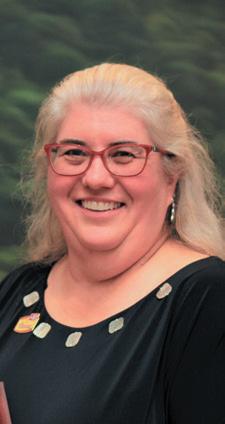
practitioner with Centra Medical Group in Bedford and often treats farmers in the community. She gives presentations on farm safety and mental health and the importance of preventive healthcare in agriculture, and advocates for agriculture on the state and national levels.
Cynthia Gregg of Brunswick County was named VFBF Distinguished Farm Bureau Woman. The award honors involvement in a farm or agricultural business, an agricultural leadership role and participation in community activities.
She is an active member of the Brunswick County Farm Bureau Women’s Committee, and longtime Virginia Cooperative Extension agent and unit coordinator in Brunswick County, where she provides educational programming related to animal science. Her Extension education career has spanned over 32 years.
Myra Leonard of Carroll County was named runner-up.
Makayla Bryant of Greensville County is the 2022 Virginia Farm Bureau Ambassador. The program recognizes young adults for their interest and achievements in agriculture and provides an opportunity to serve as an ambassador for agriculture and Farm Bureau.
Bryant is in her second year at Virginia Tech, studying crop and soil sciences and agronomy. She plans to pursue a career as an Extension agent or agriculture education teacher.
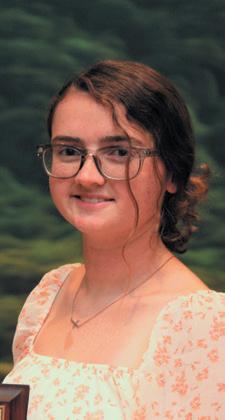
All winners received cash prizes. Finalists were awarded travel packages to the VFBF Annual Convention in 2022 and American Farm Bureau conferences in 2023.
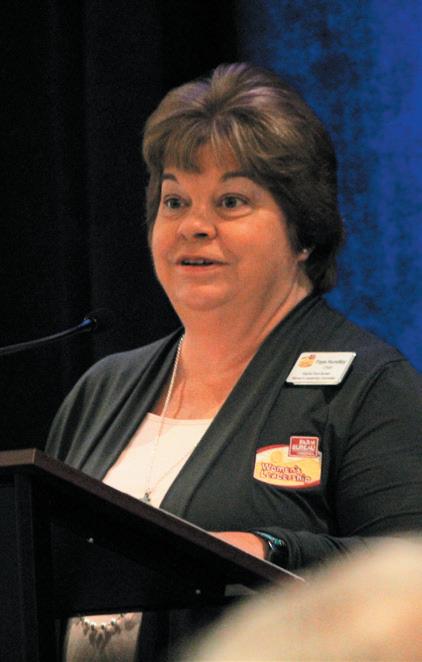




A morning of workshops was a catalyst for productive discussion. Topics included AITC toolkits; Farm Bureau membership ins and outs; farm safety; community and local food systems; and Women’s Leadership Committee challenges and changes. Six state delegates and dozens of
Farm Bureau women made some headway on issues impacting rural Virginians at legislative roundtables. The conversations were an opportunity for Virginia lawmakers representing both rural and urban districts to discuss issues relevant to farmers. They shared insights on farmland preservation, solar facilities and land use tax assessment. Roundtable delegates were Wendy Gooditis, D-Boyce; David Reid, D-Ashburn; Chris Runion, R-Bridgewater; Briana Sewell, D-Woodbridge; Kathy Tran, D-Springfield; and Tony Wilt, R-Harrisonburg.
Conference participants were recognized for their past year’s support of Virginia AITC during a donation celebration. County Farm Bureau women’s committees collectively donated $17,256 to AITC. Additionally, silent and live auctions during the conference raised a combined $6,802.




AITC donation celebration, conference events raise $24,058Attendees at the 2022 Women’s Leadership Conference in Harrisonburg celebrated the magic of farming while participating in educational workshops, donating to Agriculture in the Classroom, and touring local farms and businesses, like Mt. Crawford Creamery.

What: 1985 GMC Sierra 1500
The story: Bickley’s 1985 GMC already had 108,000 miles on it when he purchased the truck from a private seller in 1990. In the years to follow, the engine has been rebuilt twice, the transmission has been replaced four times, and the driver’s side door and tailgate have been replaced with mismatched Chevrolet parts.

Bickley uses the truck for just about everything on his beef cattle and hay farm, and said he wouldn’t hesitate to drive it 30 minutes to Charlottesville or an hour to Richmond.
“It looks bad, but it’s mechanically sound,” Bickley explained. “I just fell in love with it. It’s one of those things that you really like, and you’d hate to see it go.”


The story: This apple butter kettle has been in Michael Beahm’s family for an estimated 125 years.
“It came from my father’s home in Prince William County,” Beahm said. “Pop said his grandfather bought it at an auction in the early 1890s.”


They typically use the kettle biannually, and it’s an all-day family affair, lighting the fire around 4:30 a.m. and finishing up around 6 p.m.
“We start out with a full kettle of almost 40 gallons of sauced apples, boil it down to the consistency we like, making between 15 to 18 gallons of apple butter to eat,” he said. “I guess it’s staying in the family. We just need to figure out who will take responsibility of it!”
The door is from a Chevrolet Suburban that once was owned by the local sheriff’s office. The faded outline of a sheriff’s badge is still evident on the door, and the word “Doc” is displayed in yellow letters. Bickley said because he continues to fix his truck after 30 years and over 300,000 miles, the lettering serves as a playful reminder that he is a “doctor of junk.”
Where: Lexington
The story: In the late 1970s, Hart would spend the summers with his maternal grandparents, J.C. and Helen Grigsby Pope, in Walker County, Georgia. Hart’s grandfather gave him his pocketknife around 1977. Hart continues to use it today to complete tasks like baling hay, splitting wood and
“When Mr. Bane retired in 2005, my father, Jeff Johnson, started running the farm,” Johnson said. “Now my father and I operate it with the help of Doak Bane, Mr. Bane’s son.”
What: 1944 Peanut Cleaning Cooperative membership investment certificate


Where: Sussex County
understand that back in the day there were lots of Farm Bureau affiliates like this one. It’s an interesting piece of history.”
The certificate was signed by co-op treasurer Edward F. Gillette, who also was secretary of the Virginia Farm Bureau Peanut Committee, according to a 1945 article in Southside Virginia News.
fixing farm equipment on his heritage livestock and sweet corn farm.
“It doesn’t have the functions of a Swiss Army knife or a multi-tool, but every time I pull it out to use it, Gramps is there with me,” Hart said. “One day the knife may break, in which case I might put it away, or I might lose it. Still, I’d rather carry it for years, use it the way he taught me and keep his memory present.”

Who: Jessica Johnson
What: 1959 model Ford 601 Workmaster
Where: Giles County
The story: William Doak Bane Sr. took over Cedar Grove Farm in 1943 after his father died, turning the horse farm into a cattle operation. For many years he used this 1959 model Ford 601 Workmaster for planting and harvesting corn, wheat and oats for his cattle. It included components such as a mower, rake and baler, and a PTO pulley system to run a hammer mill in the grainery. He also had a firewood mill, using the same PTO system to cut wood faster.
The story: While cleaning out the attic in her Chesterfield County home, Patti McFarland opened a box and found this September 1944 certificate documenting W.E. Carraway’s $5 investment into the Peanut Cleaning Cooperative Inc. membership capital fund. Carraway was her late husband William McFarland’s grandfather, a peanut farmer in Sussex County.
“He was related to other peanut farmers in the area, at least that’s what the family Bible shows,” McFarland said.
The seal says Peanut Cleaning Cooperative, Farm Bureau Affiliate Inc. 1939. Peanut cleaning was an intensive process requiring warehouse machinery and workers.

“If W.E. Carraway bought one share into the co-op, then other families did too,” McFarland said. “I’d love more information about this, if anyone is willing to share!”

What: Wooden washing machine

Where: Loudoun County
The story: Eddie and Marty Potts found this wooden washing machine in their springhouse that was built in the 1700s.

“Small peanut farmers didn’t have the wherewithal to do the cleaning themselves, so they formed a co-op,” said Howard Nester, Chesterfield County Farm Bureau president. “I

“We have a lot of old things around here!” she said. Seven Revolutionary War patriots are buried in their family graveyard, and the Potts’ grandchildren are the 11th generation on the farm deeded to them by Lord Fairfax.

“The washing machine tub is made completely out of wood, and it has a metal handle to agitate with it,” Potts continued. “We think it’s probably from the 1820s. The barrel part was still intact, and we had it restored. Now it sits on its original stool in our dining room!”

to work and had to put gas in my tank, and now I think I’m going to need food.’ Of course, we get them served so they can care for their families.”
Emergency food assistance benefits are set to expire in October, and upcoming winter months see the most need.
ARTICLE AND PHOTOS BY NICOLE ZEMASmall steps taken to address food insecurity become heroic efforts when neighbors are in need.

For eight years now, Plenty! has provided 1,800 individuals with 131 tons of food throughout Floyd County. The nonprofit operates a large food pantry, produce delivery program and working farm, and hosts community meals and nutrition education programming.

“And we want to help
folks improve their health by offering low-glycemic, healthy options,” said Nancy Tome, Plenty! executive director.
Supporting farms and donors help Plenty! ensure a source of seasonal produce or pantry staples for neighbors—whether they need a reliable, ongoing source of food, or just a safety net when facing sudden food insecurity.


That safety net is increasingly necessary, Tome said.
Pantry traffic has steadily increased since January 2022, up 40% in August from the peakpandemic record.
Tome described conversations with patrons. “They say, ‘I’m on my way
“All of that extra assistance will be going away for the most vulnerable people in our community—children and the elderly,” Tome continued. “We think folks we haven’t seen in some time will be coming back. We’re trying to plan for that.”
Supporting farms contribute to Plenty!’s store. Others share plant seedlings. Home gardeners donate their excess. Grocery stores divert items reaching sell-by dates. Food banks send provisions. Volunteers beat a path.

They’re all food-rescue heroes, Tome explained.
“This type of work requires a lot of people with intention to take extra steps to make this happen,” she said. “We’re focused on bringing stability to the process and opening this platform to every food hero in the community who wants to tackle this, whether they’re grocery store employees taking extra steps to
Floyd County’s food heroes tap into community abundancePlenty! Farm manager Mark Hammes cultivates seasonal produce to meet the needs of Floyd County's food insecure. About 800 pounds of these purple potatoes were harvested in late summer. Plenty! board member Helen McClain weighs donations from an area grocery store. Chestnuts are collected on site and either frozen or planted.
divert the food, or a farm allocating their produce. They have to make arrangements to get that to us, and we must have the ability to say, ‘Yes, we’ll take it.’ ’”
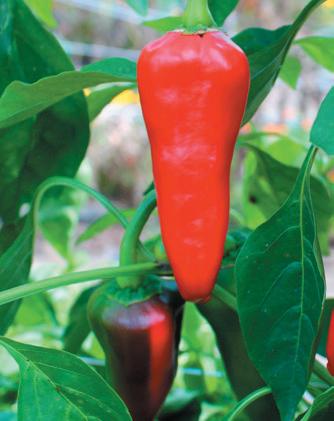
Plenty! Farm, established in 2014 on 18 acres along the Little River, is managed by Mark Hammes with the help of interns, volunteers and patrons. Small, intensive plots are hand-worked, bigger plots are machine-worked, and the farm is irrigated with river water.
“I grow as many vegetables as I can sustainably, within budget, for our pantry,” Hammes said. “But I don’t grow any cucumbers or summer squash because we get so much donated!”
Last season, Plenty! Farm grew 800 pounds of purple potatoes and 600 pounds of corn. It also produces elderberries, kale, chestnuts, tomatoes and shagbark hickory nuts.
Chinese chestnut trees line the property, dropping nuts that Hamme collects to freeze or plant.
“It would be great to find even more ways to recover the investment of growing food and getting it to those without access,” Tome concluded. “Especially in food deserts.”
to fresh produce and other healthy foods is limited in the city. Many East End, North Side and South Side communities are considered “food deserts,” or areas where affordable, healthy food is difficult to find.
For organizations like Richmondbased nonprofit Shalom Farms, closing the divide between nutritious food and those in need is the pillar of their existence.
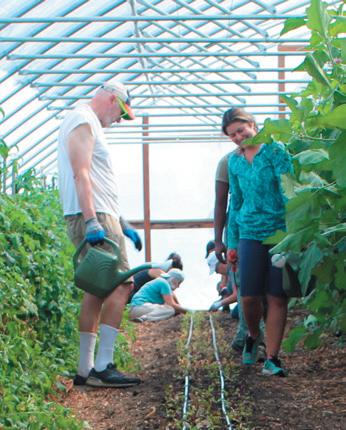
“Healthy food is a huge component of living a healthy life, so we want to make sure that everyone has equitable access to healthy food,” said Erin Lingo, director of programs for Shalom Farms.
“Our mission is ‘Working Together to Grow and Share Healthy Food,’ and we have two farm sites and grow about 200,000 pounds of produce each year,” Lingo added. “We are really working to bridge the gap for folks who have trouble accessing healthy food on a consistent basis.”
Specifically grown to serve the city of Richmond, produce from Shalom Farms’ 2-acre farm in Richmond’s North Side and 8-acre farm in Powhatan County is distributed through its Mobile Market and Produce Rx Program and donated to a dozen food pantries, as well as the local Meals on Wheels program.
Each year a network of 6,000-plus volunteers helps Shalom Farms harvest its crops, making it possible for the organization to provide fresh fruits and vegetables to underserved individuals.
organization’s aim is to grow produce that is easily recognizable and easy to prepare. This includes broccoli, cabbage, collards, cucumbers, kale, lettuce, peppers, squash, tomatoes and zucchini.
In the city of Richmond, almost one-fourth of the population lives in poverty. In some communities in the city’s East End, North Side and South Side, poverty rates are even higher. Economic and geographic access
Shalom Farms also promotes the “kitchen confidence” of its customer base through food skills classes, Lingo said. The classes, offered as part of Produce Rx with community partners, teach individuals how to prepare healthy meals that they’ll enjoy eating. Those skills are then paired with clinician-provided nutrition education that helps shoppers better understand how food directly affects their overall health.
Amber Albee, manager of Shalom Farms’ farm in Richmond, said the
The bulk of the produce grown at Albee’s location is sent directly to food pantries throughout Richmond. The Powhatan farm provides most of the produce that is sold through the organization’s Grow to Go Mobile Market, Shalom Farms’ flagship program.
Through its mobile market, Shalom Farms visits 15 sites a week, stopping in communities and neighborhoods that aren’t served by traditional farmers markets or grocery stores. Here, shoppers can purchase farmfresh produce at significantly lowered prices. With programs such as the Virginia Fresh Match program further reducing prices by as much

Nonprofit Shalom Farms fills need in Richmond’s food deserts
as an additional 50%, customers can purchase healthy food that may otherwise be unobtainable.
“We’re unique as a nonprofit farm in that our funding to support all of our operations comes through donations,” Lingo explained. “Because of that, we’re able to sell at prices that communities can afford to purchase at, rather than the price we would need in order to make a revenue.
“When someone comes to the mobile market and they’re carrying home bags full of produce, we know by very real accounts that they’re increasing their consumption of fresh fruits and vegetables,” she added.
“In a country where very few of us are getting our recommended daily nutrients, it’s amazing to see the amount of produce that is going into communities whose only other close access to food might be a corner store.”
 ARTICLE AND PHOTOS BY ALICE KEMP
ARTICLE AND PHOTOS BY ALICE KEMP
On a damp, overcast Monday morning, Jim Hankins and several volunteers load squash, zucchini and cantaloupe into a pickup truck from Haymarket’s St. Paul’s Episcopal Church.
“Give them a whole basket of butternut squash,” Hankins said, pointing to baskets overflowing with produce picked just an hour earlier. “And do two baskets of delicata, two of spaghetti squash and acorn squash.”

The produce was grown on Fauquier Education Farm in Warrenton, a nonprofit that doubles as a teaching farm for beginning growers and a produce hub for local and regional food assistance.

A self-described “obsessive gardener,” Hankins has been the
organization’s executive director since 2014. Drawing on a background in commercial farming and agriculture management, he oversees the 10-acre farm from seed to harvest. In between hosting classes about crop production and soil science, Hankins, his three employees and a roster of faithful volunteers cultivate 60 varieties of fruits and vegetables.
Coordinating harvests and donation pickups twice a week from May through mid-December, they distribute everything grown on the farm to a network of over 80 food banks and pantries, reaching 12,000 to 15,000 food-insecure people annually.

“We’re in our second-best year,” Hankins said. “Last year alone, we had a 41,000-pound increase. The year before last, our total was 71,000 pounds. Last year that bumped up to just under 112,000 pounds.”
He credits that to better crop management and volunteer enthusiasm from people looking for safe, outdoor activities during the COVID-19 pandemic.
A new deer fence didn’t hurt either.
“Deer were just devastating the crops,” Hankins said.
“I love the serendipity of how things work out,” he added. “I put up a deer fence, and here comes the pandemic.
All of a sudden the demand on the food banks goes way up, and our production went way up to match it.”
Hankins’ mission is to provide fresh, nutritious food to those who need it most. Food banks often receive boxed and canned food, but fresh produce is harder to come by.
“I used to manage a farm in western Massachusetts, and I’ve done upscale farmers markets,” he explained. “I want to take the same quality of produce that I would have taken to an upscale farmers market to the food banks. We want to help people improve their diet choices.”
Crops are curated with food banks and recipients in mind. The assortment Hankins grows keeps the selection from being monotonous, and hardy produce like squash, kale and cabbage has a longer shelf life.
“We don’t have any refrigeration or storage here,” he noted. And most food banks have limited refrigeration.
Hankins is just glad the farm is able to help food banks, and he’s grateful for the volunteers who dedicate their time on the farm.
“The people who are motivated to do this are really exceptional humans,” he said. “The satisfaction of knowing everything we’re growing is being donated to area food banks is incredibly rewarding.”


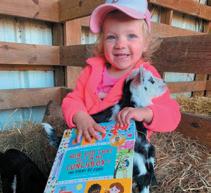
For three decades, Virginia Agriculture in the Classroom has connected schoolchildren with agricultural concepts, leading to 500,000 students better understanding the value of agriculture each year.

The program, housed at Virginia Farm Bureau Federation since 1992, helps educators learn agricultural concepts through professional development and resources, school grants, teacher awards, volunteer initiatives and fundraisers.

Tammy Maxey, Virginia AITC’s executive director, has been an integral part of the nonprofit for 16 of the last 30 years. She said in the last year, a record-breaking $430,000 was raised to support AITC activities , and the program continues to grow.
“‘Connecting Children to Agriculture’ is more than a slogan to us,” Maxey said. “AITC makes every effort to ensure the children we reach through our programs will be inspired by their growing knowledge of agriculture and take home a curiosity that engages the entire family in more exploration of our industry.”
As the COVID-19 pandemic began, there was no roadmap for sharing educational resources in the era of social distancing and school closures.
“The pandemic impact served as a catalyst for growth in unexpected ways,” Maxey recalled. “We needed to serve our children and educators regardless of if we could go to a school or visit one another directly. Every bit of our growth the last few years was virtual—social media, creating online resources. It forced probably 10 years of change overnight!”
AITC administrators redesigned
content development and program delivery formats, resulting in a new continuum of virtual lessons. Now its website, social media pages and YouTube channel are filled with activities for educators and children, like virtual field trips and lab demonstrations.
And they’re always enhancing content to keep children, parents and educators active on social media. Educators receive biannual newsletters that include lesson plans and suggested classroom activities. Youth stayed engaged throughout the year with The Eggs-Ellent Young Chefs Recipe Contest sponsored by The Virginia Egg Council, and the Harvest of the Month campaigns.

“In its first year, we saw 100 teachers and did a couple teacher trainings,” Maxey said. “Pre-pandemic we directly trained up to 3,000 teachers each year! Now we provide professional development for teachers and name a teacher of the year. We offer grants and have an army of
volunteers and AITC ambassadors.”
Grant recipients incorporate agricultural projects into core lessons each year. During the most recent school year, AITC awarded 62 minigrants to Virginia educators, and 20,000 students gained hands-on agricultural experiences inside and outside of the classroom. Grant-funded projects focused on gardening and horticulture, nutrition, embryology and STEM themes.
And throughout the annual Virginia Agriculture Literacy Week in March, volunteers statewide, including VFBF President Wayne F. Pryor, read the AITC Book of the Year to Virginia schoolchildren. In 2022, more than 1,000 volunteers read to around 60,000 students across the commonwealth.

“Reading agriculture-themed books to children gives us an opportunity to share agriculture with students who might not be familiar with the industry,” Pryor said. “And it helps them understand why it is so important in Virginia, and in their own communities too.”
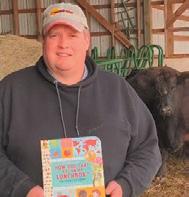
Enough poinsettias are grown to fulfill pre-booked orders, with some extras to serve new customers. They buy poinsettia plugs from various suppliers of rooted cuttings. In July, plugs are transplanted into pots.

“Starting in November, the plants take on color, and this is a happy place to be,” Maggie Crosby Edwards said.
BY NICOLE ZEMAThe poinsettias purchased from your local garden center were possibly grown by and shipped from Cros-B-Crest Farm, a family-run wholesale operation in Staunton.

Growing 21,000 poinsettias annually, the Crosby family has been been beautifying homes, businesses, churches and community spaces since 1986, supplying independent garden centers throughout Virginia and in surrounding states.

As owners Harry and Beverly Crosby pivot toward retirement, their children Maggie, Aaron and Jimmy, have stepped up to take over greenhouse and farm operations.
Some Oaxalis are a symbol of luck and are popular indoors and for gifts. The burgundy triangularis variety adds nice color, and the Iron Cross variety has unique green leaves and purple cross-shaped markings.

Low-maintenance succulents that bloom during early- to mid-winter, Christmas cacti are festive with colorful pink, red or white blooms
against green stems. Like poinsettias, they start flowering when the nights get cool and the days shorten.
Cyclamens make an attractive holiday table centerpiece with


The Prestige red variety is consistently their best-selling poinsettia.

“Though there are so many varieties of red,” Edwards continued. “And we have the novel varieties. Red glitter is probably the most popular, with a speckled variation to the bracts. There’s also pink, maren, marble and burgundy, and multiple different whites.”
Some whites have a yellowish tint, others are stark. Some cultivars are bred for size.
Edwards said the houseplants are a timeless staple for the holiday season.
“Go back and watch Home Alone,” she said. “You’ll see a poinsettia in every scene! I would love the market to get back to that point, when we had poinsettias in every room.”
butterfly-like flowers that extend above heart-shaped leaves. The winterblooming houseplant enjoys cooler temperatures, bright indirect light and moderate watering.
Virginia-grown poinsettias brighten spaces with classic colors and novel cultivarscyclamen oaxalis oaxalis christmas christmascactus cactus poinsettia cyclamenpoinsettia Native to balmy Mexico, Cros-B-Crest Farm’s poinsettias are grown under the protection of a retractable roof system that provides shade and warmth and prevents overwatering. The operation also grows fall and spring nursery crops.

Soaring fertilizer costs sometimes stimulate creative methods of nutrient management while easing the financial burden on farmers.
At a recent Virginia Tech field day, livestock farmers and pasture and hayland experts shared strategies to reduce fertilizer inputs as the industry grapples with price spikes.

“You’ve got a global pandemic, a war in Ukraine, Chinese supply shutdowns, all kinds of reasons,” said John Fike, forage specialist at Virginia Tech’s School of Plant and Environmental Sciences. “Prices are coming down, but still quite expensive. However, depending on your situation, you may not need that fertilizer.”
Many farmers’ standard pasture fertilization regimen involves popular blended synthetics like 10-10-10 or 19-19-19. Fike suggests this often results in phosphorus being applied excessively while potassium is under-applied.
“We can do a better job being more targeted if we don’t use a straight blend,” Fike continued.
J.C. Winstead of Craig County has operated 200-acre Meadow Creek Cattle Co. for 40 years. He learned grazing procedures to reduce nutrient inputs and improve soil health from Virginia Cooperative Extension and the Virginia Forage and Grassland Council.

Though pastures require nutrients to reach peak productivity, Winstead has not applied commercial fertilizer to his fields of orchardgrass and fescue in eight years.
Instead, he frost-seeds forage legumes like alfalfa and red and white clover, and rotationally grazes cattle using permanent and temporary electric fencing. A practice called intensive grazing involves moving cattle
at least daily between small paddocks so plants in the grazing cell are uniformly grazed. The cell rests for regrowth, usually 30 to 60 days, while the soil absorbs the nutrients.
“I keep cattle controlled in a small area,” Winstead said. “What they take from the land, they return.”
Fike discussed other methods to help reduce nutrient inputs, like soil testing. An Extension agent can help tailor a fertilizer plan using results of a soil test.
“You can’t manage what you can’t measure,” Fike said, and shared the following strategies to help reduce nutrient inputs:
Lime is one of the best fertility investments. Higher pH generally increases soil nutrient availability and improves legume growth. Legumes can infuse nitrogen into the soil to support pasture and crop productivity.
Graze 300 is a statewide Extension program promoting management that extends grazing to 300 days a year and
reduces hay feeding. This also reduces fertilizer inputs and cuts feed costs. Feeding hay away from where it’s cut also moves nutrients, but with good grazing management “those nutrients aren’t being lost on the farm,” Fike explained.
A hay or pasture field with low fertility could benefit from bale grazing in winter to reintroduce nutrients to the site.
Adding species such as chicory or plantain can increase pasture diversity and animal performance. Deeply rooted species such as chicory also can unearth nutrients that have moved lower in the soil profile.
Fike is investigating innovative bale grazing strategies and alternative forages. Farmers interested in participating may email jfike@vt.edu.
Use the Virginia Farm Bureau identification number, available at vafb.com/benefits and from your county Farm Bureau, when making a reservation. Present your membership card when you check in.

Yamaha Motor Corporation, U.S.A., designs, engineers and tests its all-terrain and side-by-side vehicles in the real world. Their products are assembled in America at a state-of-the-art facility in Newnan, Georgia.
To claim your rebate:


Members have up to 30 days after purchase to apply for the $250 rebate*, and there is no waiting period for new members to use the Yamaha discount.
Go to vafb.com/membership-at-work/membership/ benefits, and search for Yamaha. Click on the link, select your state, and enter your Farm Bureau membership number and other required information. Click submit, and Yamaha will send a $250 rebate check within 6-8 weeks of submitting the request.
*

ThoughJason Seward wasn’t born with a head start, his experiences navigating hardships as a youth became a mechanism to seize his destiny.
Recently named the 2021 Ralph Stokes Award Honoree for Virginia Farm Bureau, the 40-yearold Seward is one of the youngest recipients to earn this prestigious award and is an inspiration to others who have faced challenges. He serves as Virginia Farm Bureau Mutual Insurance Co. agency manager in Surry County, employed with the company 16 years now.

Throughout Seward’s childhood, his father was often incarcerated, struggling with substance abuse, leaving Seward’s mother, Rita, to provide for their three young children. Most days she left home before dawn, working all day and studying at night pursuing a nursing degree.
“Those circumstances with my dad, and how she handled it—I owe everything to that,” Seward said. “It taught me how to be resilient. She did nothing for herself. The grind that she went through to keep us going, which we didn’t recognize then, means there is no stopping me from being successful.”
As a child, Seward had to grow up quickly, becoming the “man of the house” at age 10.
Those early experiences have helped keep life’s stressors in perspective.
Though Seward already had a good job at Dominion Energy’s Surry Power Station in 2006, Agency Manager John Drewry was unrelenting in recruiting the then 24-year-old to VFBMIC’s sales force.
Since high school, Seward was known as a wellliked and motivated, yet humble, competitor—ideal salesmanship qualities.
Seward knew he’d be a family man someday, and the flexibility of sales was a good fit. He met his wife, Kati—a loving, supportive, grounding force in his life—a few months after joining Farm Bureau. They now have their own family, including Emma, 10, and JJ, 5.
The career is great, but family is everything to Seward.
“The rewards of this job have been unbelievable. I’ve been fortunate enough to win trips and bring our kids places I can’t image doing without Farm Bureau. Because of those privileges, I try to keep myself
reflecting. Stay humble and don’t get accustomed to it.”
Seward admits he’s not really a salesperson. A broad range of personal interests and infinite curiosity about others facilitates sincere connections. The business opportunities simply follow.
“My No. 1 goal is to earn their trust,” he said. “I want to come to your house, meet your kids and find things in common.
He reports to Regional Sales Manager Erwin Maitland, who said Seward gives 100% and is willing to share ideas. “Jason recognizes he stands on the shoulders of those who came before him and is laying a solid foundation for those coming after him.”
Mentoring new agents is his true calling. While Seward jokes that he’s a “wild thinker with some crazy ideas,” his proposal to implement a sales internship program was lauded by company leadership and started earlier this summer.
“Jason goes above and beyond to help and motivate
others, especially new agents,” said Ray Leonard, VFBMIC vice president of sales. “He is one of the most positive and optimistic people you will ever meet. He always thinks about what’s in the best interest of the members, company and employees.”
Seward shares a deep bond with one agent in particular—Nansemond County Farm Bureau agent and lifelong friend Jake Mintz. They grew up together and, as teens, operated J&J Lawn Service.
Mintz joined VFBMIC in 2015 after seeing his friend’s success. “And he’s crushing it,” Seward said of Mintz. “For him to come to this company is the highlight of my career.”

Have you always wanted a John Deere Gator? Now is your


The Virginia Farm Bureau Women’s Leadership Committee is raffling a John Deere Gator 590M, valued at over $13,000, to support Virginia Agriculture in the Classroom. All raffle proceeds will benefit Virginia AITC and its programming, which provides valuable agriculture education and hands-on experiences to thousands of Virginia youth.
Raffle tickets are $20 each and can be purchased at participating Farm Bureau offices, online at bit.ly/2022GatorRaffle or by scanning the QR code below. Don’t hesitate to purchase yours, as only 4,000 tickets will be sold!



The raffle is sponsored by James River Equipment and Virginia Tractor, and the winning ticket will be drawn on Nov. 30. The winner will be notified following the Virginia Farm Bureau Annual Convention. You need not be present to win.
Participants must be 18 years or older to enter. All winnings are subject to IRS guidelines. *Gator may differ slightly from image below.
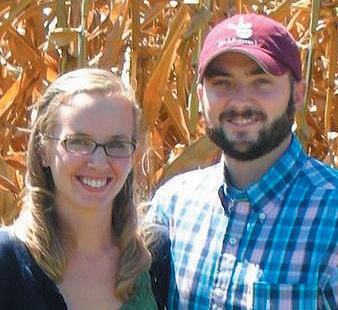
In January, some of the Old Dominion’s brightest young farmers will compete for national recognition at the 2023 American Farm Bureau Annual Convention, to be held Jan. 6-11 in San Juan, Puerto Rico.
During the AFBF convention, producers representing the Virginia Farm Bureau Federation Young Farmers Program will vie for honors in the Young Farmers & Ranchers Achievement Award and Excellence in Agriculture Award programs and the annual Discussion Meet competition.
Jennifer and Jacob Gilley of Orange County are Virginia’s competitors for the AFBF Excellence in Agriculture Award. Virginia contestants for the YF&R Achievement Award and Discussion Meet will be determined during the 2022 Virginia Farm Bureau Annual Convention in late November.
At press time, prizes and sponsors were still being finalized.
Raffle tickets are $20 each and can be purchased
participating Farm Bureau offices, online at

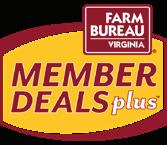

Acquiring auto, health and renter’s insurance may seem like a daunting task to some young adults, but obtaining coverage isn’t as complicated as it seems.
BY ADAM CULLERThere comes a time in most people’s lives when they’re ready to spread their wings and start life away from their parents or guardians.
Striking out on their own can provide young adults a new level of freedom, but joining the real world also may be daunting when it comes to purchasing their own auto, health and renters insurance policies.
Although every young person’s financial and living situations differ, obtaining insurance is important for all of them to keep their property, finances and health protected.
Though renters insurance is not required by Virginia law, it’s extremely valuable for those who are renting anything from a studio apartment to a five-bedroom house with friends. In some instances, landlords may require their tenants to have renters insurance to occupy their property.

Consumers often think renters insurance only provides coverage for a resident’s personal items in a rented dwelling, but it also can extend to other important coverage areas, depending on the policy.
Renters insurance also provides personal liability coverage to policyholders, helping to protect them from expenses that could arise from someone suffering an injury in the insured’s home.
Liability coverage can provide protection to the insured if they injure another individual elsewhere,
and covers medical expenses such as ambulance transportation, emergency room visits and diagnostic tests.
“Young people tend to focus on covering their vehicles and other possessions and often forget to consider what it is that’s going to protect them,” said Lisa Whitus, personal and commercial lines underwriter for Virginia Farm Bureau Mutual Insurance Co. “If you get into a situation where you accidentally cause bodily injury or property damage to another party, the liability coverage on your renters policy is going to have your back.”
Unlike renters insurance, Virginia law requires motorists to either insure
their vehicles with mandated liability coverage limits, or pay the Uninsured Motor Vehicle Fee to the Virginia Department of Motor Vehicles.
The UMV fee, which costs $500, does not provide any insurance coverage. In the event of a collision, uninsured drivers are liable for damage to their own vehicle and damage caused to any other vehicles involved.
The minimum liability coverage limits for auto policies that are in effect from Jan. 1, 2022, until Dec. 31, 2024, are $30,000 for bodily injury per person, $60,000 for bodily injury per accident and $20,000 for property damage per accident. Motorists may increase their limits in each category to further protect themselves financially.
Policy premiums—or the amount paid
to an insurance company for coverage— often vary based on age, the motorist’s driving record, deductible amounts and additional endorsements placed on a policy. Common endorsements include Other Than Collision coverage, also known as comprehensive coverage, and zero glass deductible coverage (see page 27).
While additional endorsements may raise a motorist’s premium, they ultimately help protect the insured vehicle from incidental damage.
“With all the new technology that is coming out, new vehicles are getting very expensive, and you may not want the minimum coverage limits or a high deductible,” said Laurie Gannon, VFBMIC vice president of claims.
“That’s why you want to make sure you’re covered, and the best way to weigh your options is to call your Farm Bureau agent. They’re there to go over different coverage options with you, explain what terms like ‘bodily injury’ mean and work with you to make sure your coverage meets your needs. That’s worth its weight in gold.”
If their parents’ health plan covers dependents, individuals typically can stay on the plan until they turn 26 years old. However, it isn’t uncommon for parents to remove their children from their plans once they leave home as an independent.
If a young adult is entering the workforce upon leaving home, they may be offered coverage by their employer. However, if an employer doesn’t offer coverage, they still have options.
Individuals may purchase an Affordable Care Act-compliant health plan during the ACA open enrollment period, which runs Nov. 1 through Jan. 15, 2023.
However, they may qualify for a special enrollment period that allows them to sign up for health insurance outside of the open enrollment period. According to Healthcare.gov, qualifying events include losing coverage through
a parent’s plan, getting married, having a child and changing residences.
If an individual doesn’t qualify for a special enrollment period and the open enrollment period has passed, they may apply for short-term health insurance plans to provide temporary coverage.
Though short-term health plans don’t meet ACA requirements, they offer basic protection against devastating medical expenses. Virginia law limits enrollment in short-term health plans to three-month increments, and individuals are limited to six months of coverage under a short-term health plan in any 12-month period.
According to the Centers for Disease Control and Prevention, more than 40% of America’s youth suffer from at least one chronic condition, underscoring the importance for people of all ages to have health insurance.
“Research is showing us that younger people are developing medical issues that require treatment, which comes at a cost,” said Tracy Cornatzer, sales manager for VFB Health Insurance division. “Even if you’re a young, healthy person, accidents happen. And if an accident requires an emergency room visit, hospital stay or physical
therapy, you may be looking at a very large bill without the benefit of having a health insurance policy.”
To learn more about the wide range of insurance products offered by Virginia Farm Bureau, visit vafb.com/insurance, vafb.com/health or call your local Farm Bureau office.

Here’s what to bring when you visit your local Farm Bureau office:
• Driver’s license
• Copy of vehicle registration
• Copy of the vehicle’s title
• Lienholder information, including the account number, if the vehicle isn’t owned outright
• A list of all regular operators of the vehicle
• Driver’s license or another valid form of identification
• A copy of your lease agreement
• An appraisal if you plan to endorse additional high-value personal property
 BY ADAM CULLER
BY ADAM CULLER
It may not be obvious when you look at your vehicle, but your windshield plays several roles in getting you from point A to point B safely.
Providing a clear view of the road is the most obvious function, but in newer vehicles windshields often contain key components of systems designed to help protect drivers. These advanced safety features include adaptive cruise control, blind spot alert systems and lane-keeping assistance.
To ensure these systems work properly, windshields must remain damage-free. However, with hazards such as destructive weather, downed trees and kicked-up rocks posing constant threats to vehicles, keeping your windshield in good condition often comes down to chance.
Fortunately, drivers can protect their vehicles from unexpected damage caused by non-collision events with Other Than Collision coverage, commonly known as comprehensive insurance.
In addition to covering damage caused by downed trees, errant rocks and weather-related damage, OTC coverage provides financial protection against theft and vandalism, fire and accidents involving animals.
Virginia Farm Bureau customers who endorse their personal auto policies with comprehensive insurance can opt for a zero glass deductible, effectively rendering automobile glass replacements free of charge for covered losses. This option applies to any glass-only damage done to windshields, rear glass, side windows and sunroofs on private passenger vehicles.
“Glass claims are among the most common claim occurrences for vehicle owners,” said Anne Baskette, director of claims administration for Virginia Farm Bureau Mutual Insurance Co. She noted that VFBMIC paid 7,118 glass claims between Sept. 1, 2021, and Aug. 31, 2022.
“But if you have a $0 glass deductible on your auto policy, there won’t be any out-of-pocket expense to fix glass damage to your vehicle,” she shared. “With all of the advanced safety systems that now come standard on vehicles, having that extra layer of financial protection is very beneficial to the customer and their wallet.”
Often when vehicles—especially new models—require a full windshield replacement, any forward-looking sensors or cameras that may be embedded in the glass must be recalibrated. These services can cost several hundred dollars at an automotive shop, leaving motorists without OTC coverage or a $0 deductible to pay for pricy repairs.
“Customers typically carry deductibles on their auto policies to reduce their insurance premiums, but at the same time, they may decide that they don’t want to pay for an expensive glass claim. A zero deductible is the best of
both worlds,” Baskette explained. “Motorists can still have a $0 deductible for glass damage, but still hold a higher OTC deductible to help keep their premiums low. Generally speaking, this is a great low-cost option for our customers.”
Policyholders can start a glass claim by calling 800-452-7714 and following the prompts. From there, Safelite Solutions will help coordinate a repair at the automotive shop of the customer’s choosing. Customers also may report a claim online at vafb.com.
To inquire about glass coverage on your auto insurance policy, contact your Farm Bureau agent.
The annual meeting of Virginia Farm Bureau Mutual Insurance Company Policyholders will be held at 8:30 a.m., Thursday, December 1, 2022, at The Greenbrier Resort, 101 Main Street West, White Sulphur Springs, WV 24986 for the following purposes:
1. To receive and act upon the reports of the Company officers.
2. To elect a Board of Directors, each to serve a term of one year.
3. Other business as may properly come before the meeting or any adjournments thereof.
Dated this 1st day of October, 2022.
Kathleen M. Early, Secretary
Acup of hot apple cider is perfect for warming up on a chilly fall or winter day. The traditional drink is celebrated on National Apple Cider Day, Nov. 18, just in time for the holidays.

Apple cider has a long history dating back to ancient Rome. Early apples were too bitter to be eaten on their own, so they were pressed and fermented into a boozy hard cider. The popular drink eventually made its way to North America after English settlers brought apple seeds to grow their own apples for cider. It became the primary beverage of that time.
While apple cider has boozy roots, the non-alcoholic, unfiltered sweet apple cider drink favored today came about during Prohibition. Alcoholic cider was no longer marketable, so apple farmers began growing sweeter varieties for eating, and promoted fresh, unfiltered apple juice as a healthy drink. That sweet apple cider is now a traditional holiday drink that can be enjoyed on its own, heated up with spices or used as an ingredient in a delicious dish.
24 whole cloves
4 cinnamon sticks
1 cup sugar
1 gallon apple cider
1 quart orange juice
1 cup lemon juice
1 quart pineapple juice
Tie the spices in a cloth, or leave them loose, whichever you prefer.
In a large pot, combine all the ingredients, and simmer for 10 minutes. Serve hot.
Store the remainder in the refrigerator.
—Recipe courtesy of Country Treasures from Virginia Farm Bureau Kitchens

1 pork tenderloin, skin removed
salt and freshly ground black pepper
2 tablespoons olive oil
1 tablespoon butter
1 firm apple, peeled, cored and cut into 12 slices
½ medium onion, thinly sliced
⅓ cup unfiltered apple cider
¼ cup applejack brandy
½ cup chicken stock
2 tablespoons minced fresh sage
⅓ cup heavy cream
Slice the pork tenderloin into 1" thick slices and pound to flatten to approximately ¾" thick. Sprinkle with salt and pepper.
In a heavy skillet over medium high heat, add the olive oil and sear the pork just over a minute on each side. The meat should be browned on the outside and still pink on the inside. Transfer to a plate.
In the same skillet, melt the butter. Add the apple slices and onion, and sauté until the apple starts to brown, about 4 minutes. Add the apple cider and brandy, and boil until the liquid reduces to a glaze, about 2-3 minutes.
Increase the heat to high, and add the chicken stock, sage and any accumulated pork juices from the plate. Boil until the liquid is reduced to a syrup, about 3 minutes. Add the heavy cream, and cook for another 2 minutes to reduce.
Reduce the heat to medium, and return the pork to the pan, turning the meat to coat. Simmer to heat the meat thoroughly, about 3 minutes, and adjust the seasonings to taste. Transfer the pork to a serving plate. and spoon the sauce over the meat. Serve immediately.

⅓ cup granulated sugar
1 tablespoon water
3 cups peeled, diced apples
1 cup chopped walnuts, toasted
3 cups flour
2½ teaspoons baking powder
½ teaspoon baking soda
1 teaspoon salt
¾ teaspoon ginger
1 teaspoon cinnamon
2 sticks of butter
1 cup sugar
¾ cup light brown sugar
3 eggs
1 teaspoon vanilla extract
2 ounces cream cheese
2 tablespoons apple cider
1½ cups confectioners’ sugar, sifted
Heat oven to 350°.
In a medium saucepan over medium high heat, cook the granulated sugar and water without stirring, until sugar caramelizes, about 4 minutes.
Reduce heat to low, and stir in apples. Cook covered until softened, about 6 minutes. Slightly mash the apples,
and then cook uncovered until liquid evaporates, about 5 minutes. Cool completely.
Spray a 10” tube pan with cooking spray, and set aside.
In a medium skillet, toast walnuts over medium heat, stirring constantly, until lightly browned and fragrant, about 3 minutes.
In a medium bowl, sift flour, baking powder, baking soda, salt, ginger and cinnamon.
In a large bowl, beat butter and both sugars on high speed until fluffy, about 4 minutes. Add eggs one at a time. Reduce speed to low, and gradually add the flour mixture. Fold in apples and walnuts.
Transfer the batter to the pan, and bake until the cake is deep golden brown and a toothpick comes out clean, about 50 minutes. Turn the cake onto a rack and let cool completely.
In a separate bowl, beat all the icing ingredients until smooth, adding additional cider or sugar to reach desired consistency. Drizzle over the cake, and serve.
—Recipe courtesy of the New York Apple Association
The Medicare Annual Election Period runs Oct. 15 through Dec. 7 and is when Medicare beneficiaries can purchase or change their Medicare Advantage plans or Part D prescription coverage for the upcoming year.
During this time, subscribers can enroll in, withdraw from or switch Medicare Advantage plans, also known as Medicare Part C, as well as their Part D prescription coverage. Policy changes made during the Annual Election Period go into effect Jan. 1, 2023.
“This enrollment period is a good time to review your current coverage to see if you’re on a plan that best fits your needs for the upcoming year,” said Tracy Cornatzer, sales manager for VFB Health Insurance division.
“Your prescriptions and medications can change throughout any given year, so it’s important to take a look at the bigger picture of what certain plans will provide.”
Individuals who turn 65 years old outside of the Medicare Annual Election Period still can obtain coverage for 2023. New beneficiaries can enroll during their Initial Medicare Enrollment Period, which starts three months before the person’s 65th birthday, and concludes three months after.
From Nov. 1 until Jan. 15, individuals and families under 65 years old can enroll in or change their health, dental and vision plans during the Affordable Care Act open enrollment period.
ACA plans do not require medical
underwriting, and those who subscribe during this open enrollment period will have coverage for the coming year. The effective date is determined by the date applications are submitted, but coverage generally goes into effect Jan. 1, 2023, for those who enroll before the new year begins.
During this time, employers may sign up for a group health plan for their employees without having to contribute directly toward employee premiums.
The effective date of this group coverage is Jan. 1, 2023.
To learn more about upcoming open enrollment periods or coverage options, call your county Farm Bureau office or 800-229-7779.
109534
For more information on benefits, please contact your agent or the health plan. Not connected with or endorsed by the U.S. Government or the federal Medicare program. The purpose of this communication is the solicitation of insurance. Contact will be made by an insurance agent or insurance company. Anthem Health Plans of Virginia, Inc. trades as Anthem Blue Cross and Blue Shield in Virginia, and its service area is all of Virginia except for the City of Fairfax, the Town of Vienna, and the area east of State Route 123. Independent licensee of the Blue Cross and Blue Shield Association. ANTHEM is a registered trademark of Anthem Insurance Companies, Inc. The Blue Cross and Blue Shield names and symbols are registered marks of the Blue Cross and Blue Shield Association. AADVOTH006M(15)-VA 55681VASENABS
This policy has exclusions, limitations and terms under which the policy may be continued in force or
Bill Kreider, president of Prince George County Farm Bureau, died Sept. 9.
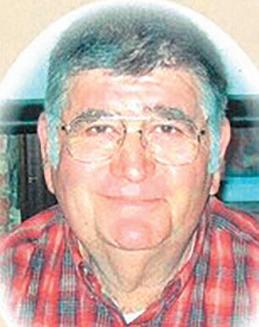
Mr. Kreider, who was 80, had served as his county Farm Bureau’s president since 2003.
He was chair of the county Farm Bureau Resolutions Committee and a member of the organization’s Legislative Action Committee.
A Prince George Farm Bureau member for more than 40 years, Mr. Kreider was a longtime member of the organization’s board of directors. Willie Bresko served alongside him on the board and said that, in addition to his work with Farm Bureau, Mr. Kreider was committed to helping local youth make connections with farming.
“He was a big promoter of Farm Bureau and Virginia Agriculture in the Classroom,” Bresko said. “He helped


organize an annual farm day where elementary students from the county would come out to his farm to learn about agriculture and where their food comes from.”
An avid livestock producer, Mr. Kreider raised beef cattle and was instrumental in helping local officials understand the importance of agriculture and its contributions to the county, Bresko added.
Mr. Kreider chaired both the Prince George Board of Zoning and the James River Soil and Water Conservation District board, and was a member of the Prince George Resource Conservation and Development Council.
Outside of agriculture, he was employed for 28 years by Hercules Fire and Safety Department before he retired. Mr. Kreider is survived by his wife, Brenda; two daughters; 11 grandchildren; and eight great-grandchildren.

We know the challenges you’ve been facing – we’ve faced them, too.

Your dedication is unmatched and we’re here to discuss solutions wherever you need us, from the barn to the kitchen table.
Call us when you’re ready. farmcredit .com
